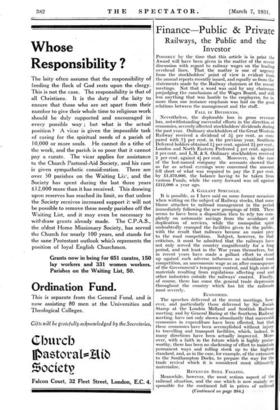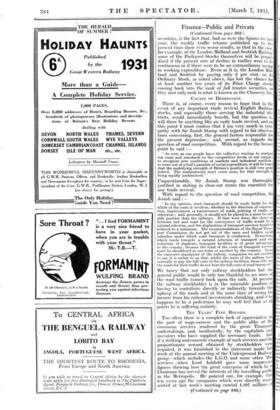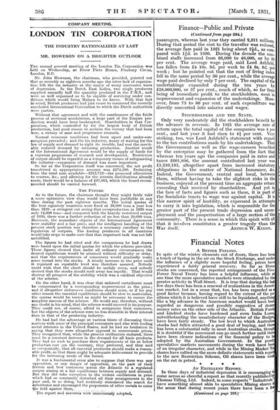Finance—Public & Private
Railways, the Public and the Investor
POSSIBLY by the time that this article is in print the Award will have been given in the matter of the recent discussion with regard to railway wages on the leading overhead lines. That the matter is one of urgency from the stockholders' point of view is evident from the annual reports recently issued, and equally so from the statements made by the Railway chairmen at the recent meetings. Not that a word was said by any chairman prejudging the conclusions of the Wages Board, and still less anything that was hostile to the employees, for in more than one instance emphasis was laid on the good relations between the management and the staff.
FALL IN DIVIDENDS.
Nevertheless, the deplorable loss in gross revenue has, notwithstanding successful efforts in the direction of economies, severely affected stockholders' dividends during the past year. Ordinary stockholders of the Great Western Railway received a dividend of 51 per cent. as com- pared with 74- per cent. in the previous year, Southern Deferred holders obtained 1 f per cent. against 21 per cent., London and North Eastern Preferred 4 per cent. against 3 per cent. and L.M. & S. Ordinary stockholders received 2 per cent. against 41 per cent. Moreover, in the ease of the last-named company the accounts showed that so far as actual earnings were concerned the amount fell short of what was required to pay the 2 per cent. by £1,370,000, the balance 'having to be taken from various Funds, while the carry forward was nil against £212,000 a year ago.
A GALLANT STRUGGLE.
It is possible, as I have said on some former occasions when writing on the subject of Railway stocks, that some blame attaches to railroad management in the period immediately following the new groupings of 1923. There seems to have been a disposition then to rely too com- pletely on automatic savings from the avoidance of duplication of services, while the Monopolist spirit undoubtedly cramped the facilities given to the public, with the result that railways became an easier prey to the road competition. Subject, however, to that criticism, it must be admitted that the railways have not only served the country magnificently for a long period, and not least in the War years themselves, but in recent years have made a gallant effort to stand up against such adverse influences as subsidized road competition, an uneconomic wage as an after consequence of the Government's temporary control, and high costs of materials resulting from regulations affecting coal and other industries outside the railways' control. Finally, of course, there has come the general trade depression throughout the country which has hit the railroads most severely.
ECONOMIES.
The speeches delivered at the recent meetings, how• ever, and particularly those delivered by Sir Josiah Stamp at the London Midland and Scottish Railway meeting, and by General Baring at the Southern Railway meeting, have not only shown abundantly that successful economics in expenditure have been effected, but that these economics have been accomplished without injury to travelling and transport facilities, which, indeed, in many directions have been actually improved. More- over, with a faith in the future which is highly praise- worthy, there has been no slackening of effort to maintain permanent ways and rolling stock up to the highest standard, and, as in the case, for example, of the extension to the Southampton Docks, to prepare the way for the trade revival which it is considered must ultimately materialize.
REVENUES STILL FALLING.
Meanwhile, however, the most serious aspect of the railroad situation, and the one which is now mainly re- sponsible for the continued fall in prices of railroad (Continued on page -384.) • Finance—Public and Private (Continued from page ,382 ) securities, is the fact that, bad as were the figures for last year, the weekly traffic returns published up to the present time show even worse results, so that in the ease, for example, of the London Midland and Scottish Railway some of the Prefe;red Stocks themselves will be jeopar- dized if the present rate of decline in traffics were to be continuous or if there were to be no extraordinary saving in working expenditure. Even as it is, the London Mid- land and Scottish by paying Only 2 per cent on its Ordinary Stock, as noted above, has lost the chance for at least another ten years of its Prior Charge stocks coming back into the rank of full trustee securities, as they now only rank in what is known as the Chancery list;
CAUSES. OF DEPRESSION. -
There is, of course, every reason to hope that in the event of any important trade revival English Railway stocks, and especially those serving the industrial dis- tricts, would immediately benefit, but the question is, will there be anything like an early trade revival, and on this point I must confess that I am very much in sym- pathy with Sir Josiah Stamp with regard to his observa- tions concerning, first,- the general factors responsible for the present depression ; and, second, as regards the question of road competition. With regard to the former point he said :-- " As soon as our people have the collective wisdom to readjust our costs and standards to the competitive levels of our output; to recognize new conditions of markets and industrial methods; to come out of a fool's paradise asocial expenditure, it will be found that the underlying strength of -Britain's position is still very great indeed. The readjustment must come soon, for that strength is
being rapidly undermined." • ' •
Unquestionably, Sir Josiah Stamp was thoroughly justified in stating in clear-cut terms the essentials for any trade revival.
With regard to the question of road competition, Sir Josiah said :- " In my opinion, road transport should be made liable for the whole of the costs it involves, whether in the direction of construc- tion, improvement or maintenance of roads, policing of traffic, or otherwise ; and, generally, it should not be placed in a more favour- able position than the railways. If that were done, the choice as between rail and road for the conveyance of traffic would be a natural selection, and the duplication of transport services would to reduced to a minimum. The recommendations of the Royal Trans- port Commission do not get rid of the open and hidden social subsidies under which road transport is conducted. Everything which tends towards a natural selection of transport and the reduction of duplicate transport facilities is of great advantage to the country, because the total of the costs of transport services must be shouldered in one form or another by the country. From the narrower standpoint of the railway companies we are entitled to say it is unfair to us that, whilst the users of the railway have normally to pay the full costs of the railway facilities, those who use the roads for their traffic do not bear the full costs of road transport.
We fancy that not only railway stockholders but the general public would be only too thankful to see some o the road traffic turned back upon the rails. At .present the railway stockholder is in the miserable position of having 'hi contribute directly or indirectly towards the upkeep of the roads and at the same time of seeing his income from his railroad investments shrinking, and if he happens to be a pedestrian he may well feel that at all points he is suffering unfairly.
TEN YEARS' FINE RECORD.
Too often there is a complete lack of appreciation on the part of wage-earners and the public alike of the enormous services rendered by the great Transport 11-01 undertakings, and, incidentally, by the capitalists and investors who have supplied the necessary funds. And if a striking and concrete example Of such services and th proportionate reward obtained by stockholders wet required, it was furnished in the statement made 1 week at the annual meeting of the Underground Railwa) group—which includes the L.G.O. and some other 'Bit services—when Lord Ashfield gave some irnpressiv figures shoing how the great enterprise of which he Chairman has served the interests of the travelling publi in the Metropolis. He pointed out, • for example, tha ten years ago the companies which Were-directly repre - sented -at last week's meeting carried 1,397 millions 0 - - -. --(Continued on page-386.)-
Finance—Public _and_ Private
(Continued from page 884.) passengers, whereas last year they carried 2,811 millions. During that period the cost to the traveller was reduced, the average fare paid in 1921 being about 214., as com, pared with 1/d. in 1930. During the decade the enm. bined staffs increased from 83,000 to 46,000, or by 89 per cent. The average wage paid, said Lord Ashfield, has fallen from £4 10s. 3d. per week to £4 8s. 8d. per week ; but-he pointed out that the cost of living in fell in the same period by 30 per .cent., while the average wage paid- declined by only 7 per cent. The capital- of the undertakings expanded during the ten years by £28,000;000, or 57 per cent., much of which, so far from being of immediate profit to the' stockholders, went in improvement and expansion of the undertakings. More- over, from 75 to 80 per cent. of such expenditure was directly converted into salaries and wages.
STOCKHOLDERS AND THE STATE.
Only very moderately did the stockholders benefit by the advance in revenue. In 1921 the average rate of return upon the total capital of the companies was 4 per cent., and last year it had risen to 4f per cent. Very striking, too, was Lord Ashfield's statement with regard to the tax contributions made by his undertakings. That the Government as well as the' wage-earners benefited by the enterprize may be gathered from the fact that whereas ten years ago the companies paid in rates and taxes £601,896, the amount contributed last year was £1,210,135, altogether apart from increased statutory obligations in the matter of National Insurance, &e. Indeed, the Government, central and local, between them, without having to take the slightest risks in the business, enjoyed at the present time an aggregate return exceeding that received by shareholders. And yet in the face of facts and figures such as, these, it is part of the Socialistic tenets to wage war against capital. It is this narrow spirit of hostility, as expressed in attempts to carry it into legislation, which is responsible for the greater part of the present trade depression and unem- ployment and the pauperization of a large section of the community. There is a sense in which this spirit with all that it involves constitutes a greater tragedy than the




























































 Previous page
Previous page